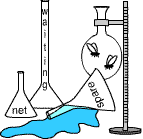Science vs. the General Public
Created | Updated Mar 13, 2002

For years now, we have relied on science to advance our society to its current state. We owe everything to science: our technology, our lifestyle, even our jobs and food. Without science, we would be nowhere.
Yet even now, war has been waged on the scientific community. And by whom, may I ask? Those ever-critical culprits, the 'general public'. The recent rows over the new genetic manipulation
technology have caused a great stir amongst even those people unaware of the consequences of it. Other old arguments, such as those over nuclear weapons and power carry on into the distant horizon of time, and will continue for the foreseeable future.
Perhaps, before I continue, I ought to make clear my partitioning of society, the human population of this planet. It is divided into separate sects: the government (the guys trying to control the people and give the country a good name), their departments (army, police, etc. wielding this control), businesses (people making all the money), the scientific community (people making all the advances), and the general public (everyone else, well known to criticise all the other sections, and yet still necessary to keep everything running).
My main argument in this article is that the scientific community itself is not responsible for any of the bad side effects their inventions and discoveries have produced and made known the public. I shall begin with the current argument raging over genetic engineering.
We are already well into the debate over genetically modified foods, and many people – for whatever reason – are sceptical about it. Can you imagine the feelings of the general public when they found out that the first human had been cloned? Quite, quite appalled. However, the reason for these feelings is in fact not the actual discovery that we can clone a human, but that we have. And who is responsible for this occurrence? Believe it or not, it's not the scientific community, but rather the commercial sector.
Most certainly it's true. It was the scientific community that discovered the technology and the methods of implementing it, and it is they who intend to use the technology to benefit mankind, cure diseases and so on. It is the fault of other sectors that the technology is being misused. For example, the commercial sector wishes to make money out of cloning dead pets for their owners (a terrible idea in my opinion, as just looking at the clone would stir up old feelings of the original), and some governments would just love to get their hands on the human cloning methods. No doubt there are also a few maniacs whose sole intention it is to breed a race of über-humans, bent on world domination. That's what the public are arguing against, and is, funnily enough, exactly what the scientific community is also arguing against.
A scientists' goal is to advance society in ways to benefit it in the long run. It was never meant to create the atom bomb or to clone humans for moneymaking purposes. It is merely in the unfortunate
position of being subservient to governments and businesses the world over.
I would like anyone to name any disastrous side effect that has been caused by the scientific community. Nuclear weapons? Commissioned by governments for use by armies. Side effects of
vaccines? Apparent because of poor implementation by governments and health services. Animal testing (the brutal side, that is)? Commissioned by businesses, make-up in particular. As you see, all the things that the general public has been complaining to the scientific community about are actually not under the control of the latter – rather the public should be focussing its 'efforts' at the real parties responsible for the events and effects.
As I've said, science in its purest form is the search for advancement and bettering of society and lifestyle. However, science has a regrettable history of being ever under the influence of the other sectors of the human population. Religion was one, where the discovery of how the solar systems works was held back for who knows how long. Then governments came along and took the principal of nuclear power (used even now for beneficial energy generating purposes) and used it for mass destruction. All this has given the scientific community, those responsible for our very existence, a bad
name.
Of course, science has been responsible for a few problems, and can be rightly blamed for them. Early nuclear power stations, for example: some terrible disasters occurred there. However, science by
nature comes to its final conclusions through trial and error, and as such should be granted these few mistakes.
Another thing the public argues against is that science has no morals. I could say here and now that morals only hinder scientific development, but then you would no doubt turn around and say 'But how
did we get here without morals? They're an integral part of life.' In that one statement the general public has countered its previous claim the science has no morals. As science is responsible for all
actual advances in technology and such, and morals are in effect everywhere, it can be taken as read that scientists do indeed work with morals in mind. Often they are forced to do things against their will (development of atomic weaponry springs to mind again), but in those situations it the oppressor that overlooks the moral implications of the technology, not the scientists – they just follow the orders blindly.
This is quite unfortunate. I imagine a new society where science is given free reign, free from the influences of the public, government, commerce and anything else. If the scientific community could be left alone to get on with their work, you would be astounded as to the advances we would make in all fields of science.
